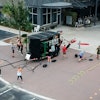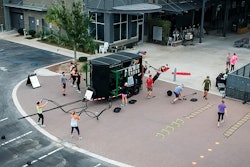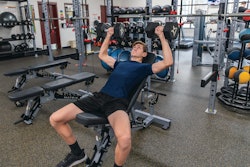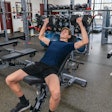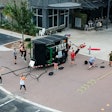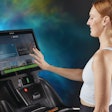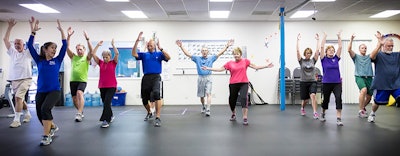
Leave it to a Ph.D. in neuroscience to think big. In February 2012, Becky Farley opened what she says is still the world's only community center dedicated to physically training people diagnosed with Parkinson's disease. Last July, Parkinson Wellness Recovery — or PWR!Gym, as its known in its hometown Tucson, Ariz., and beyond — doubled in size to 6,000 square feet. But those expanded walls have done little to limit the imagination of Farley, who sees her exercise-is-medicine mindset spreading into North American communities' YMCAs and Jewish Community Centers — anywhere with space and trainers willing to challenge patients to strive for, in her words, "bigger, faster movement." Senior editor Paul Steinbach asked Farley, who says she has a waiting list of people seeking license to open their own PWR!Gyms, to share her grand vision.
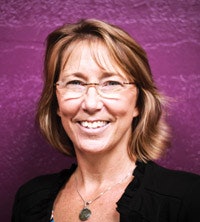 Becky Farley
Becky Farley
Q: What's your greatest challenge as trainers of this population?
A: There's a huge stigma with Parkinson's that causes people to withdraw. In fact, preventing that withdrawal and inactivity is the hardest thing, and it actually makes the disease worse. The disease takes away their internal motivation. Every time you do something and feel good about it, your brain spits out dopamine, which makes you go, "Oh, cool. I'm going to do that again. I like it." People who gamble compulsively have too much dopamine, but people who have Parkinson's are the opposite. They're apathetic. They don't have enough internal will and drive to keep moving. For Parkinson's, skill training is about bigger movement through interval training and progressive aerobics. It's high effort. It's basically beyond what the individuals would self-select. They have to be challenged.
Q: What types of equipment does your facility feature?
A: We have treadmills, ellipticals and bikes, but in terms of the skills that we train, we really teach functional fitness. Function is the primary deficit in Parkinson's — those everyday movements that you don't think about, like shifting your weight, rotating and being able to actually transition from one posture to another to get off the floor. It's really not about the equipment. It's about how hard you get people to work, the specificity of the training and targeting the real problems.
Q: How many people do you serve?
A: I do workshops all over the country and world now, but locally, we have 110 members who come at least three days a week. But that's only part of it, because we also have two physical therapists who each have 30 one-on-one appointments. We know there are almost 150 people diagnosed each year in Tucson, and we should be seeing every one of those people. Sometimes it's seven, eight years or more before they even see a physical therapist. And most of them are never empowered with information about exercise. Most doctors do not tell them to increase their activity and seek the services of an expert on exercise.
Q: Why is that?
A: I do not know. We know exercise is medicine. I just think because it's not a pill, they don't know how to prescribe it. There are a few who do, but it's just rare, and it really blows my mind. I mean, there is 20 years of research on the effects of exercise on the nervous system, and everybody knows that brain health and brain repair can happen, but nobody seems to want to advocate for it. It's like, "Just go to the gym down the street." But that's not enough for people who have a neurodegenerative disease. You need specialized, focused coaching — challenge — because they can't do it by themselves. It takes feedback — teaching people a skill. So we as therapists have to advocate more for what we offer, and we're trying to teach fitness professionals how to have people with Parkinson's in their classes — what to do and how to help them learn and do their best.
Q: What kind of feedback do you get from clients?
A: They say things like, "I can roll in bed now." They had forgotten how to roll in bed, and after all the practice, they just one morning got up and realized they were able to roll, sit and get out of bed with no problem. These are simple things — things we take for granted. And we hear that all the time. Hopefully, there's some carryover benefit of the exercise like, "Gosh, I didn't even realize how immobile I was or how big my problems were, and now I can roll again." They're in tears sometimes.
Q: What's your next big move for the business?
A: People with Parkinson's are eligible for physical therapy the day they are diagnosed. We want to show that we don't need a lot of appointments, but if you give us, let's say, 14 a year, we can keep people healthier. So right now I'm beginning to start conversations with Medicare, to see if we can do a pilot. If we can show that some limited number of appointments is preventative and slows their motor deterioration, that's the key to this being part of the healthcare system. Instead of people going to the hospital, they come to a place like this. I really want to make that happen.













